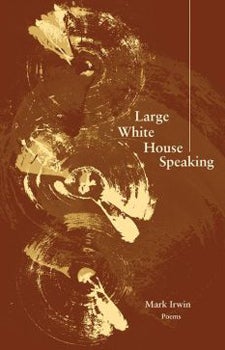The Metaphysical House
Mark Irwin’s new collection of poems Large White House Speaking (New Issues Poetry and Prose) has been published to critical acclaim. This large white house isn’t what you may think. Irwin has built something otherworldly here.
Susan Bell: Tell us about your inspiration for these poems and the themes they address.
Mark Irwin: In many ways the book is concerned with the passage from a physical to a spiritual world. If I were asked, ‘What is this Large White House?’ I would probably say that it is one without walls or roof. I’m very interested in borders and boundaries, especially those between the natural and material world, and the sacred and profane. Several poems in the collection address the notion of death and the crossing of that boundary. I think that the quote by Charles Wright, which serves as the book’s epigraph, also charts its architecture:
The line between heaven and earth is a grass blade,
a light green and hard to walk.
S.B.: The title of the collection, Large White House Speaking, is also the title of one of the poems. At first glance the title suggests some sort of political theme and yet the poem is about home, memory, family, the passing of time, yearning, aging and loss. Tell me more about this poem.
M.I.: The title is not meant to be political in any sense. This is a metaphysical house, but one that we all enter, sometimes unknowingly, throughout our lives from birth onward, through rituals, holidays, moments of sleep, and artistic creation.
Yes, certainly I am very interested in the passage of time, and especially how memory and desire tend to radically distort time. Desire and memory are like two jars in which we pour the former into the latter. As we become older we relive our desires in memory, especially as they pertain to family and ‘house,’ a metaphor for home. Perhaps I focus that notion in these lines from the title poem:
People are windows,
lenses that focus emotion the way a magnifying glass focuses
light, and the bright points burst into flame, from morning to memory.

The cover of Large White House Speaking was designed to capture the notion of metaphysical speaking and a kind of lyric mortality by depicting whirring fan blades in the color of dried blood.
S.B.: Your poems are rich with metaphor and descriptions of birds, animals, trees and nature, creating strange, beautiful and haunting dreamscapes, or in the case of the two poems about murder, menacing, nightmare scenarios. How do you use nature to express meaning in your writing? What brought you to the dark place of murder?
M.I.: I live very close to the natural world. I built a house 10 years ago in Colorado on five acres just west of the Continental Divide, in the Rocky Mountains, near the town of Salida. I have some 200 trees and a herd of deer that pass through regularly, sometimes looking inside my windows as they eat the buffalo grass by the house. So when I’m not at USC during the academic year, I’m usually there with my family.
As far as the two poems in the collection that address murder, well of course I was outraged by both murders: the first of Matthew Shepard (“Shoes”), a gay student at the University of Wyoming, who was tied to a barbed wire fence and beaten to death, for the sole reason of his sexual orientation. The same is true for the murder of a female hiker in the mountains (“Pastoral”). In both poems I contrast a region’s natural beauty and nonchalant lifestyle with a heinous crime.
S.B.: Do you write a poem in one sitting, or do they take days, months or even years to complete?
M.I.: Sometimes I get lucky and can sketch out a poem in a few hours, if it’s a shorter one, while others grow over weeks and months.
S.B.: How do you begin? Is it with an idea? An image? A word? Or are your poems born fully formed? Do you start with the first line, or do you begin with a random phrase and then build the poem organically around that?
M.I.: I usually start with a word, a phrase. Poetry begins with listening and with language. Sometimes there may be an idea, but for me, the idea must follow the music of words. Silence is important to me, for I think that listening begins in silence, as does music.
S.B.: Do you write by hand or on a computer? Do you write in a specific place, for example at your desk at home, or do you find yourself scribbling ideas or lines on napkins in restaurants or receipts at the grocery store?
M.I.: I carry a small notebook with me everywhere and I am constantly writing in it — odd words that carry some sort of electricity, or images and phrases.
I always write by hand for I like the physicality of words, and I particularly like writing from afternoon into evening, preferably by natural light.
S.B.: How do you know when a poem is finished? What do you try to achieve in a poem and how do you judge whether it is successful?
M.I.: I consider a poem complete when it is finished to the eye, but unfinished to the heart. This of course refers to form and content. Poems try to find their own form, and to complete that form, but I prefer when content is open ended and suggestive without closure. Frost characterized it best when he said the form a poem makes is like ‘a piece of ice melting on a stove’ and it ‘must ride on its own melting.’ Form and content must use each other up completely, and I would always hold that up as an aspiration.